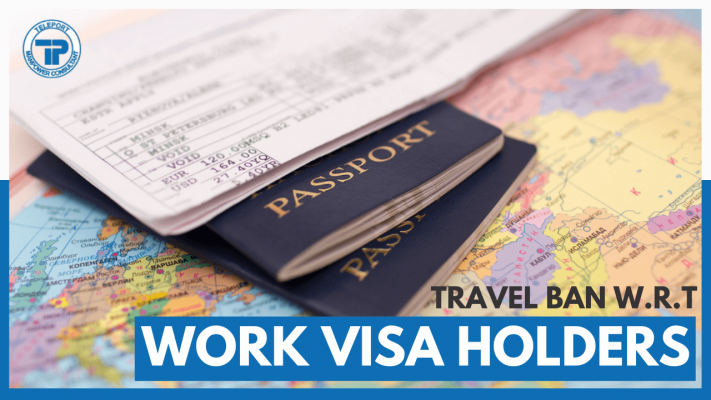Regular international flight operations have been hampered as a result of the global COVID-19 (novel coronavirus) outbreak. Airlines are cooperating closely with authorities and plan to resume regular flight operations as soon as conditions permit.
To fight COVID-19, many countries have imposed entry/ visa and permit restrictions. Quarantine and medical testing measures have also been implemented by many. Some governments have begun to relax some of these prohibitions. Some countries have also made concessions to help visitors, residents, and other visa holders who have been affected.
However, it is always crucial to keep yourself updated with the travel restrictions in such unprecedented times.
Table of Contents
Gulf Countries
Starting off with some of the major gulf countries.
Qatar

Visa holders coming from Bangladesh, India, Nepal, Pakistan, the Philippines, and Sri Lanka will be required to complete a 10-day hotel quarantine. To be eligible to leave their quarantine hotel, fully vaccinated travelers from these countries must undertake a 2-day hotel quarantine and get a negative PCR test.
People who have received the Corona vaccine outside of Qatar do not have to be quarantined if they meet the following criteria:
- The Qatari Ministry of Public Health has approved the vaccine they got.
- They’ve finished the vaccine’s recommended dosage.
- The complete dose of the vaccination has been administered for 14 days.
- When they arrive, they show customs officials a valid immunization certificate.
Saudi Arabia

Only fully vaccinated Saudi Arabian individuals will be allowed to travel overseas. Children under the age of 12 are excluded from this requirement if they are covered by Saudi Central Bank-approved insurance.
Visa holders have to quarantine themselves after returning to Saudi Arabia for seven days and must take the PCR test on the last day of quarantine. The test is not required for children under the age of eight.
About unvaccinated employees/workers, the government entity decided to use a gradualist approach in the following ways:
- Depending on the need and nature of work, direct the worker to perform activities remotely if possible.
- If the entity does not benefit from the worker’s telework, the entity must offer a due leave in accordance with its terms and conditions.
- Depending on the circumstances, the employee will be treated by deducting the days of absence from the regular leave balance or considering it as absence with an excuse without salary if the employee has no balance due to leaves, does not meet its conditions, or has reached the maximum limit for using the vacation. The employee/consequences will be dealt with in accordance with the statutory processes.
United Arab Emirates (UAE)

People coming from India, Bangladesh, Nepal, Nigeria, Pakistan, Sri Lanka, and Uganda are prohibited from entering the UAE until further notice, as of August 12, 2021. Travelers holding UAE residency visas and work visas, on the other hand, will be allowed if they have gone via these countries and meet the following criteria:
- The General Directorate of Residency and Foreign Affairs has granted visa holders pre-entry authorization.
- Travelers must have a valid PCR test certificate from a test performed within 48 hours of departure.
- Within 4 hours of their departure, travelers perform a quick PCR test.
- Upon arriving in Dubai, travelers undergo a PCR test.
Australia

Only Australian nationals, permanent residents, and close family members, Pacific Islanders transiting to their home country, New Zealand citizens residing in Australia, and New Zealanders transiting to New Zealand will be allowed to enter Australia.
Foreign nationals who are on the go because of the Australian government in order to assist with the COVID-19 response or whose presence in the country is otherwise in the national interest; those providing critical medical services or with other critical skills required to maintain the supply of essential goods, and those who work on visa and contribute to the Australian economy are also exempt from the ban, provided they request and are approved for an exemption before traveling.
Employers may need to wait until the travel ban is lifted before hiring new work visa holders/applicants.
All passengers allowed to Australia, including Australian citizens, permanent residents, and work visa holders will be compelled to self-isolate for 14 days upon their arrival. Those who do not comply may face severe fines.
Belgium

There is a travel ban in Belgium for everyone except for a few categories that include:
- Citizens or legal residents of EU nations, Iceland, Liechtenstein, Norway, Switzerland, and the United Kingdom, and their family members
- Non-EU nationals with a Belgian residence permit who are returning home
- Cross-border workers/ Work visa holders
- EU Blue Card holders whose work cannot be done remotely
- Transit travelers
- Students
- Diplomats
Due to ministry closures in three Belgian areas, applicants for work and single permits are urged to submit their applications through email.
Employees whose residence permission is about to expire and who are unable to leave Belgium owing to quarantines, flight cancellations, or travel restrictions can request a 90-day extension of stay in Belgium.
Canada

Employers with workers traveling in or returning to Canada are responsible for facilitating self-quarantine and ensuring that their employees adhere to their quarantine plans. Employers must pay quarantined employees the compensation specified in the work permit application for at least 30 hours per week, even if they are not working. Remote compliance checks are being conducted by Service Canada to ensure that employers are accommodating self-isolation and complying with associated requirements. Those who fail to comply face a punishment of up to CAD one million and the possibility of being barred from using the temporary foreign worker program.
United Kingdom

Although flights and trains are limited, the UK has not closed its borders, so you can travel to the UK if you already have a work visa or do not require one.
From June 30th, practically everyone traveling to the UK must fill out an online public health passenger locator form with their travel and contact information before leaving. After they come, they are supposed to self-isolate for ten days.
However, there is certain documentation that travelers must present at the border as proof of their exemption from filling out the form and/or from self-isolation. One of the exemptions is for those who live in the UK but work in another nation and travel at least once a week between the two countries. The self-isolation criterion does not apply to these individuals. Senior executives who meet certain conditions can apply for an exemption and have it approved before traveling to the UK.
Russia

Travelers coming to the country for work must self-quarantine for a period of 14 days. Those having newly issued work visas (or those arriving visa-free to work) are deemed to be entering for work purposes, as are those returning with previously issued long-term work visas that are still valid.
A COVID-19 test is required for applicants for a temporary residency permit (TRP), permanent residence permit (PRP), work permit (visa-nationals), or patent (CIS citizens). Applicants for HQS work permits do not need to take the test right now.
The period of self-isolation in Moscow is over, and e-passes are no longer required.
Without a fresh or renewed work permit or patent, employers cannot hire or continue to employ foreign workers. All employees must once again obtain work permits and patents.


